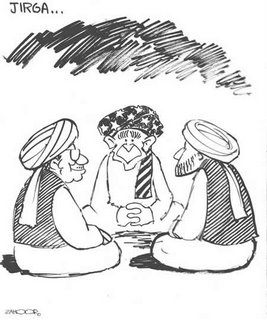
Cartoon: Daily Times, October 24, 2006
Taliban-style militants roam N Waziristan after pact
Daily Times, October 24, 2006
MIRANSHAH: Pakistani militants Mohib and Amir used to cross the porous border from the Waziristan region of Pakistan to neighbouring Afghanistan whenever they had the urge to fight US-led forces.
But their trips have stopped since Waziristan tribal leaders struck a deal with Pakistani authorities last month barring militants from entering Afghanistan from the semi-autonomous tribal state. The Pakistani government believes the arrangement will enable it to stem a growing tide of “Talibanisation” among members of the conservative and fiercely independent Pashtun tribes who live in six semi-autonomous tribal states along the Afghan border.
Sitting cross-legged in a bazaar near the Afghan border, the two bearded militants say the arrangement is an inconvenience rather than a barrier to their goals to wage “jihad”, or holy war, against US-led forces in Afghanistan.
“The border is not just in Waziristan,” 25-year-old Mohib, who declined to give his full name, said with a smile as he sat in a market stall in Miranshah. “If you can’t go into Afghanistan from Waziristan, you can go from other areas. There are many, many other ways to go,” he told Reuters, stroking his beard with one hand, while holding an AK-47 assault rifle with the other.
Critics fear the Waziristan pact risks creating havens for Al Qaeda and Taliban fighters. But Pakistani officials say the deal will empower tribal elders to control militants in their region.
These days, Pakistani forces are nowhere to be seen and government officials keep low profiles in their offices. Instead, long-haired, bearded militants wearing skull caps and with AK-47 rifles slung over their shoulders, roam Miranshah and the nearby town of Mir Ali. Some wear badges on their chests reading “Appointed by the office of the Taliban, the mujahideen of the North Waziristan Agency”.
Mujahideen, or “holy warriors”, flocked to the border region in the 1980s to battle Soviet invaders in Afghanistan. Many left Afghanistan and sought refuge in Waziristan after US-led forces ousted Afghanistan’s Taliban in 2001. From there, they infiltrated back into Afghanistan to fight foreign and government troops, until last months’ deal.
Near Miranshah’s main bazaar, the militants have opened an office in a madrassa, where their officials settle disputes among Pashtun tribesmen.
“We are responsible for maintaining law and order in the bazaar,” Eid Niaz, the deputy head of the office, told Reuters as tribesmen sat in a circle, waiting to plead their cases on issues such as disputes with neighbours.
Under the deal, tribes can be held responsible and punished for any violation to the agreement in line with tribal law. Punishment includes having vehicles confiscated by the government and shops and houses demolished or sealed.
Residents said crime had fallen since the militants took over security responsibilities in the region, though several people accused of being “American informers” had been killed.
The situation is similar to that in adjacent South Waziristan, where militants virtually took over after months of fighting with Pakistani forces.
Before the latest deal was reached, Taliban commanders in Afghanistan urged their allies in North Waziristan to stop fighting Pakistani forces and concentrate on jihad in Afghanistan instead, militant sources told Reuters.
Maulana Abdul Khaliq Haqqani, a member of a militant council, or shura, said his followers were strictly abiding by the pact, though he said the government had yet to keep its promises, such as compensation for families of those killed in the fighting. Haqqani, who is also a firebrand cleric, said they were not sending militants into Afghanistan but still offered “moral support” to those fighting jihad there.
“There is no doubt that we support this jihad against infidels, against these Christians who have invaded a Muslim land ... We support oppressed people in Afghanistan and we pray for their success,” he said. reuters
No comments:
Post a Comment